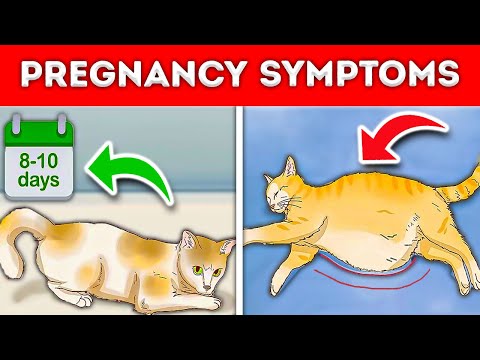How to Tell if a Cat is Pregnant Signs and Tips for Cat Owners
Welcome to our comprehensive guide on recognizing feline pregnancy. If you’re a cat owner or considering breeding cats, it’s crucial to understand the signs that indicate a cat is pregnant. This knowledge will help you provide the appropriate care and ensure a safe and healthy pregnancy journey for your feline companion.
When Do Cats Get Pregnant?
Understanding when cats become pregnant is fundamental. The cat pregnancy timeline starts with fertility, and knowing the key stages can help you determine if your cat might be expecting. Let’s explore the stages of a cat’s mating cycle and the associated timelines.

Behavioral Changes
One of the early indicators of feline pregnancy is changes in behavior. These behavioral shifts can be subtle but are essential to recognize. As your cat’s caretaker, you might notice increased affection, nesting behavior, and variations in her habits. Let’s delve into these behavioral changes and what they signify during pregnancy.
Physical Symptoms
Recognizing the physical signs of feline pregnancy is essential for cat owners. These signs can vary from subtle to more apparent changes in your cat’s body. Some common physical symptoms of a pregnant cat include:
Weight Gain:
Pregnant cats often experience a gradual weight gain, primarily due to the developing kittens and the increased need for nutrients.
Enlarged Nipples:
As pregnancy progresses, a cat’s nipples may become larger and more prominent.
Rounded Abdomen:
You may notice a gentle swelling or rounding of your cat’s belly, especially in the later stages of pregnancy.
Veterinary Confirmation
While recognizing behavioral and physical signs is valuable, the most reliable way to confirm feline pregnancy is through a visit to your veterinarian. They can employ various methods, including:
Ultrasound:
An ultrasound scan can visualize the developing kittens in the womb, providing a definitive confirmation.
Hormone Testing:
Blood tests can detect specific pregnancy hormones in your cat’s system, confirming pregnancy.
Palpation:
In some cases, a skilled veterinarian may be able to feel the kittens’ presence through gentle palpation.
Caring for a Pregnant Cat
Caring for a pregnant cat involves specific considerations to ensure the health and well-being of both the mother and her kittens. Some essential aspects of cat prenatal care include:
Nutrition:
Pregnant cats require a well-balanced diet that meets their increased nutritional needs. Consult your vet for dietary recommendations.
Hydration:
Ensure your cat has access to clean and fresh water at all times.
Veterinary Check-ups:
Regular visits to the vet are crucial to monitor the pregnancy’s progress and address any health concerns.
Comfort:
Create a comfortable and quiet space for your pregnant cat to rest, nest, and give birth.
Potential Complications
While most cat pregnancies progress smoothly, it’s essential to be aware of potential complications that can arise. Some common pregnancy complications in cats include:
Eclampsia:
Also known as milk fever, it can occur if the mother’s calcium levels drop too low during nursing.
Dystocia:
This refers to difficulties during labor and delivery, which may require veterinary intervention.
Miscarriage:
Cats can experience spontaneous abortion, leading to a terminated pregnancy.
Infections:
Pregnant cats are more susceptible to certain infections, which can affect both the mother and her kittens.
Preparing for Kittens
As your cat’s due date approaches, it’s time to prepare for the arrival of kittens. Here are essential steps to take:
Create a Birthing Area:
Set up a quiet, warm, and safe space where your cat can give birth and care for her kittens.
Gather Supplies:
Have necessary supplies ready, such as clean towels, a heating pad, and a birthing box.
Monitor the Birth:
Be present during the birth process to assist if needed, but respect your cat’s need for privacy.
Frequently Asked Questions (FAQs)
Q1. What are the early signs that my cat might be pregnant?
A1. Early signs of cat pregnancy include changes in behavior, such as increased affection and nesting, as well as physical symptoms like weight gain and enlarged nipples.
Q2. Can cats get pregnant immediately after giving birth?
A2. Yes, cats can become pregnant shortly after giving birth. It’s essential to consider spaying or neutering to prevent rapid successive pregnancies.
Q3. How long is the gestation period for cats?
A3. The gestation period for cats typically lasts about 63-65 days, but it can vary slightly among individuals.
Q4. Should I change my pregnant cat’s diet?
A4. Yes, pregnant cats require a diet with increased nutrients. Consult your veterinarian for specific dietary recommendations during pregnancy.
Q5. Can I touch my pregnant cat’s belly?
A5. It’s best to avoid excessive touching of the belly during pregnancy, especially if your cat is not comfortable with it. Respect her space and privacy.
Q6. Is it safe for my pregnant cat to continue outdoor activities?
A6. It’s safer to keep your pregnant cat indoors to protect her from potential dangers and infections that outdoor exposure can pose.
Q7. What should I do if my cat experiences complications during pregnancy?
A7. If you suspect complications or notice any concerning symptoms, contact your veterinarian immediately for professional guidance and assistance.
Q8. How do I prepare a birthing area for my cat?
A8. Prepare a quiet, warm, and safe space with clean towels and a birthing box. Monitor the area and be ready to provide assistance if needed during labor.
Q9. When can I start socializing kittens born to my cat?
A9. You can begin socializing kittens once their eyes are open, usually around two weeks of age. Handle them gently to ensure they become well-adjusted pets.
Q10. Can I spay my cat while she’s pregnant?
A10. Spaying a pregnant cat is generally not recommended, but it’s essential to consult with a veterinarian to discuss your options and make an informed decision.
Conclusion:
In conclusion, recognizing cat pregnancy and providing appropriate care are essential responsibilities for cat owners. By understanding the signs, seeking veterinary confirmation, and offering proper prenatal care, you can help ensure a healthy pregnancy journey for your feline friend.




